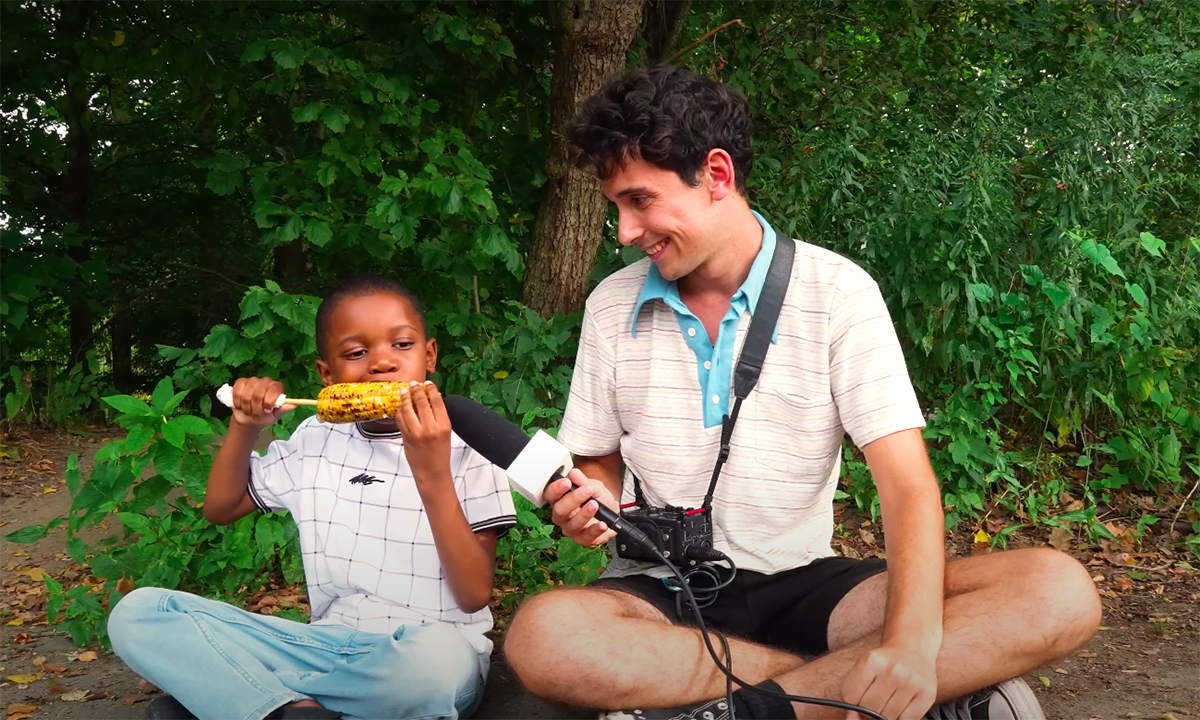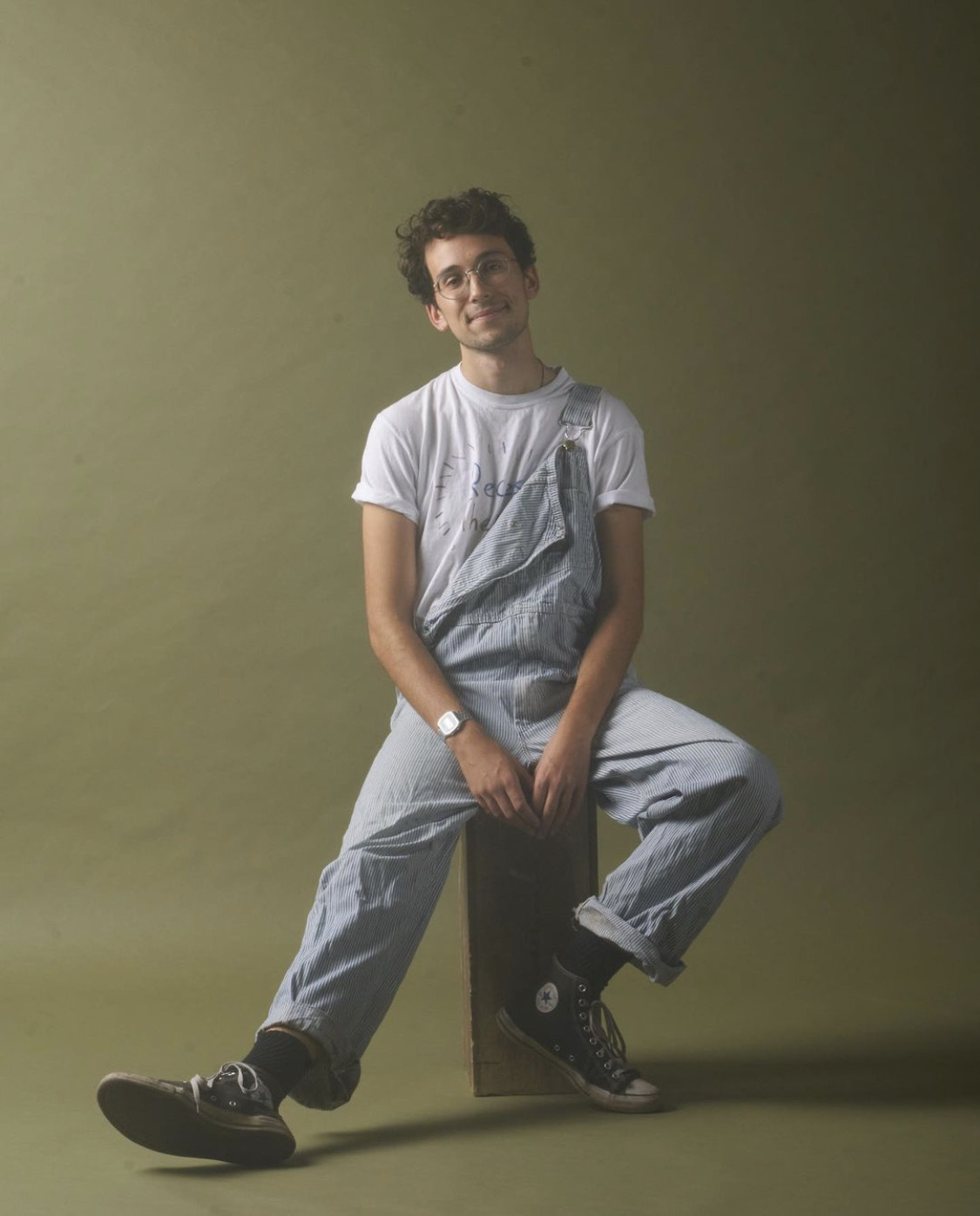Beyond It’s Corn: ‘Recess Therapy’ Creator on the Secret of Following Kids’ Joy
Viral video mastermind Julian Shapiro-Barnum on launching a social media craze & what he’s learned from hundreds of street interviews with kids

Get stories like this delivered straight to your inbox. Sign up for The 74 Newsletter
For much of the world, their first exposure to the show Recess Therapy came through a viral video this summer featuring Tariq, better known as “Corn Kid,” celebrating his favorite starchy vegetable.
“For me, I really like corn,” Tariq said in an August clip now watched over 5 million times on YouTube. It’s “a big lump with knobs” and “has the juice,” he explained. “I can’t imagine a more beautiful thing.”
Since then, the maize craze has reached seemingly every corner of the internet. A remix made by Michael Gregory, a creator behind several other viral mashups like the Double Rainbow song, has been played 73 million times on TikTok and used in over a million other videos. Brands such as United Airlines, Dunkin Donuts and Chips Ahoy have referenced the clip in their marketing. And Tariq, a New York City second grader, was officially named South Dakota’s “Corn-bassador” in early September.
In the original video, holding the microphone for “Corn Kid” and asking questions was Julian Shapiro-Barnum, 23-year-old creator of the internet show Recess Therapy, which 2.4 million Instagram users follow. Since April 2021, he has interviewed hundreds of young kids across NYC about everything from the meaning of life to peeing their pants — and countless other conversation starters in between, like fake mustaches, drones and Komodo dragons.

Across those many exchanges in parks and playgrounds, Shapiro-Barnum has developed an interviewing style that allows his guests to share their authentic, very often hilarious selves and brings viewers into the wonderful world of being a kid.
“I don’t baby the kids and I don’t talk down to them. And I think that really does wonders,” he said. “It really empowers kids to open up and grow and test ideas.”
The 74 spoke with the show’s host over Zoom to hear what it’s like being online famous and find out what’s popping on the corn beat. He also shared how his unconventional family background shaped who he is today and what it meant to him to find out his videos are now being used to train young pediatricians.
This conversation has been lightly edited for clarity and length.
The 74: What originally inspired Recess Therapy?
Julian Shapiro-Barnum: I’d been doing on-the-street content for a couple years by the time I started Recess Therapy. I was really interested in the idea of talking to real people. … One of my first shows was How Are You Doing Right Now, which was a democratized late night talk show. I’d sit on a corner with tables and chairs and whoever walked up was the guest.
By spring 2021, I had been playing around with these concepts for a while. I’d always been interested in interviewing kids. I was doing online school at the time (Shapiro-Barnum graduated from Boston University’s College of Fine Arts in 2021) and I’d do homework at the playground or something and see these kids playing around having so much fun. And I was always like, “How do they do it? How do they stay positive during all this?”
For a while, I was thinking about interviewing them about happiness and how they stay happy and eventually I did it. And it was immediately gold because they’re just so honest and authentic and sweet and funny all at the same time. And I was like, this might be something special.
There’s a lightness to the videos. What is it about how kids see the world that’s so fun and joyous?
Kids look at the world through a much less biased scope. I think a lot of their opinions are their own. … They’re not holding back about their own thoughts. They’re not trying to say the right thing — at least until they’re, like, 7. I feel like the interviews are laced with such honesty. You don’t really see that in adults and older kids. They’re not judging themselves.
How would you describe your technique as an interviewer?
I used to come prepared with a lot of questions. At this point, I come prepared with a lot of loose ideas and I really try to find what they’re most excited about. Once I find that, I just follow their joy and their interest. My job really comes in trying to find a way to make them feel comfortable and excited. And then, you know, playing until we find the thing that really is tantalizing for them to talk about for maybe 10 minutes.
One of the things I love about the videos is you validate so much of what kids say. Maybe they’re like, “It sucked when I dropped my ice cream on the ground.” And you’re like, “You’re right, that does suck.” How can adults better connect with kids and validate how they see the world?
I think what adults can do is just give them the space to feel the full expanse of their emotions, you know, let them tire themselves out. A lot of times adults try to make kids fit into the box or mode that they’re in. And so often, I find that they flourish and have so much more fun when they’re given their own space to run on their own energy.
Also, I feel like a lot of adults don’t give kids the ability to have a full true conversation. So often, I’m told that people like that I don’t baby the kids, and I don’t talk down to them. And I think that really does wonders. It’s a very simple thing that one can do, but I think it really empowers kids to open up and grow and test ideas.
Are there any specific phrases or responses that you find really fruitful?
A lot of times when we’re talking about something, before I move on, I ask, “Is there anything else you want to say about that before we go?” And so often, there is. I might be done and I move on to something else, but they’re still thinking about the last thing.
I also like to start my interviews by saying, “Is there anything you want to start by talking about?” Letting them bring whatever they’re toying with before I bring them to my conversation. I didn’t used to do that, I used to say, ‘What’s up?” Which really doesn’t work.
I’ve wanted to ask how you find people to interview. Do you show up at a park and ask around?
My team and I, we show up and we really don’t discriminate. Anyone who walks by we offer the opportunity for an interview. We found that casting the widest net possible is the best strategy because so often, the kid that I think might be too shy, or the kid that I think looks perfect and is super boisterous is not the one that is going to be [best on camera]. I have no perception of it. Often, the really quiet kid is the one who has the most to say. I’m very outgoing. So I’m attracted to high energy, but that’s not everyone.
That’s so interesting. In some ways, that could also be a lesson to educators about how to treat kids in a classroom.
Definitely. I think giving everybody the same space does a lot.
To bring it to Tariq, the “Corn Kid” who has been our biggest video to date, I don’t know if out of 100 kids if he would be my first choice of who I thought would be the funniest, craziest, but he looked really sweet. I really wanted to talk to him. And, you know, he’s amazing. But I wouldn’t have known, you know?
When you made that video, you must have known it was pretty great. But did you expect it to go viral like it did?
Oh, I couldn’t have known. I loved it, it was a great video, but I love so many of the videos that we make. But this one has bewitched the world in such a special way. People just respond so well to his true honest positivity about something that isn’t grand. He’s hyping up something very sweet and small. And I think that’s very special and unique.
I’ve seen a bunch of spinoffs of it, obviously. What are one or two of your favorite pieces of content that have come about because of that video?
I mean, the Gregory Brothers, It’s Corn song reigns supreme in my mind. At this point, I’ve worked with them and I really like them. I think they deserve a lot of credit for making this as big as it got. Their song is the song that has created all the spinoff songs.
Also, someone did a club remix at a rave. That was pretty funny. I liked that. There’s, like, hundreds of people moshing to It’s Corn. It’s crazy.
That’s awesome. So the video has been watched by millions of people, the remix listened to by millions of people. Tariq, I saw, is the corn ambassador of South Dakota. What have been the impacts of his fame for his family? I did see some of the proceeds from the remix on Spotify went to his family.
Yeah, I mean, he’s making money off of Spotify. He was a feature in The New York Times [last week]. It’s a good article. I try not to speak on behalf of Jessica and Tariq, but the article really speaks to the ways this opportunity has been beneficial to their family.
I think they’ve had a lot of fun getting to go places for free. We just went to the Empire State Building together and got an amazing tour. Since the video a lot of companies and people have really welcomed them places, which has been really cool.
Other than It’s Corn, what are your top five favorite videos that you’ve done?
Oh my gosh, there’s so many. I feel really connected to all the kids. Some I’ve had on multiple times and I have a relationship with them and their families.
But I guess I can give simple answers:
- Miles
- Sloane is great talking about how she wants to be president
- A quarter is a lot of money, such a good clip
- Dillon, the Komodo dragon kid, is always a classic recess therapy clip
- The Subaru kid
Was there a point where it went from, “OK, this is something I’m doing for fun” to “This strikes a chord and resonates with people?”
The first time I did the Pride episode in June 2021 (interviewing kids at New York City’s annual parade), the feedback was just so positive. So many people were saying how it meant something to them. And I hadn’t even been doing it very long at that point. I get so many sweet comments from people all the time. I think the show does mean a lot to a lot of people, which is very special and I genuinely appreciate (it) and makes me want to keep doing it.
I think the first time anyone ever recognized me on the street was like September a year ago, probably. And I was like, “Oh, whoa, people have seen the show and know what I look like.” It’s funny that to some people I’m, like, an internet celebrity. It’s just a weird concept.
What’s the [viewer] note that most sticks with you?
Maybe eight months ago, I got a message from a children’s hospital that they were showing the videos to young doctors to teach how to talk to kids. I was like, “Oh my gosh, you’re using my video for professionals.” Whenever somebody like a child therapist or like a teacher or a doctor reached out and was like, “Hey, this really helped me with what I do,” it means a lot to me. I went to acting school, I did comedy improv. I didn’t go to school to do any of these things. It means a lot that people are learning and using my stuff to make people happy.
Can you tell me a little bit about your family background? I know that you come from an unconventional family. How has that shaped you?
I have a very large family. I have five gay parents, three moms and two dads. Since I had so many adults in my life raising me, I was never talked down to in the same way. I had a lot of adults in my life I was friends with and who looked out for me and taught me things. The traditional power structure and dynamics weren’t there.
I’ve definitely brought that into my interviews and my interview technique and the way that I work with kids. Just bringing them that respect and, like I said, not talking down to them. Because I wasn’t, and it meant so much to me when I was a kid. I like to bring that into my interviews.
How do you describe Recess Therapy to older relatives?
Well, they all know about it. My grandpa isn’t on Instagram or anything, but we’ve been on TV a couple of times for news spots and he always gets very excited. I say it’s an online, on-the-street kids interview show where I talk to kids [ages] 2 to 8 about things as big as the meaning of life to as silly as peeing your pants.
You’ve been in The New York Times, you’ve been on ABC, what’s something about yourself you’ve never told the media?
I don’t think I’ve ever said this, but 9 out of 10 mornings. I have two Eggo waffles toasted with peanut butter and jelly and a glass of 2% milk.
Sandwiched?
Open face waffles with PB&J. Bonne Maman blackberry jelly and the peanut butter brand changes.
You can include that I’ve never said that. That’s my weird thing.
And last, what’s next? Where do you go from here?
I would love to bring the show to other places. I want to travel with it. I want to bring it to TV. I’m a comedian and actor and I’m hoping to have careers in those fields as well. But right now, I’m just really focusing on the show and making fun content and having great conversations and letting the kids show me what I should do next.
Get stories like these delivered straight to your inbox. Sign up for The 74 Newsletter

;)
